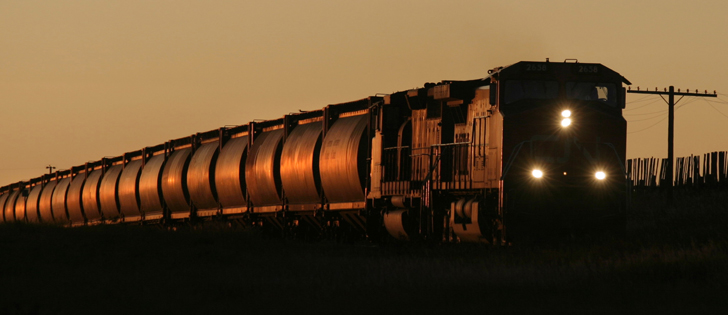Canada’s largest railway says it continues to move grain at a record setting pace this year, despite complaints from grain shippers of inadequate service.
Canadian National Railway also said it has consistently met or exceeded weekly grain movement targets set by the federal government.
CN’s message differs considerably from that of the Ag Transport Coalition, a group of Canadian grain shippers that claims to account for 90 percent of the grain that is moved by rail in Canada.
The coalition said Canada’s major railways are failing to deliver 10 percent of the grain cars requested by shippers.
Read Also

Farming Smarter receives financial boost from Alberta government for potato research
Farming Smarter near Lethbridge got a boost to its research equipment, thanks to the Alberta government’s increase in funding for research associations.
Of those that are delivered, fewer than half are arriving in the scheduled week, coalition figures suggest.
“Contrary to recent claims made by the new Ag Transport Coalition that CN is somehow failing to meet demand, we know we’re responding very efficiently to all the demand from our customers,” CN said.
“The facts are clear, when we compare our shipments with all valid car orders, our wait list stands at less than 2,000 orders, just a few days worth of car supply.”
With railways and shipper groups offering two different versions of the situation, Ottawa must assess the claims and determine where the truth lies.
Debate over what constitutes adequate rail service has become more heated in recent months as a federally appointed panel reviewing the Canada Transportation Act prepares to file an interim report to government.
Last week, federal agriculture minister Gerry Ritz said the federally appointed CTA review panel headed by David Emerson is expected to file the report before the federal election scheduled for Oct. 19.
Shippers, farm groups and railway companies are aggressively promoting their views in an effort to influence the political process.
Last week, federal transportation minister Lisa Raitt confirmed that CN has paid a $100,000 fine for failing last fall to meet one of Ottawa’s weekly grain hauling targets.
However, she also said CN and Canadian Pacific Railway have been consistently meeting their weekly targets.
[yop_poll id=”13″]
One year has passed since Ottawa issued an order in council requiring Canada’s major railway companies to move minimum amounts of prairie grain each week or face fines as high as $100,000 for non-compliance.
CN said it has exceeded Ottawa’s cumulative mandated tonnage by almost 2.5 million tonnes, or 10 percent since the first federal order was put in place.
“We are very proud of CN’s grain hauling achievements, setting new records basically every month over the last year,” said CN president Claude Mongeau.
Mongeau made his statement a few days after the Ag Transport Coalition suggested that CN and CP have delivered 192,000 of the 215,000 grain cars that grain shippers have ordered in the current crop year.
Unfilled car orders now stand at more than 22,000 cars, or 11 percent of total shipper demand for the 2014-15 crop year, the coalition said.
Unfilled orders include car orders that are still outstanding (11,000), cancelled (6,000), rejected (2,000) and denied (2,000).
“The number of hopper car orders not filled by both CN and CP has continued to increase each week since the beginning of the crop year,” the coalition said in its Week 28 report.
“Overall, unfulfilled orders have levelled off … (but) the railways are not making up ground for prior week shortfalls.”
Saskatchewan groups, including the Saskatchewan Wheat Commission, the Saskatchewan Barley Commission, the Saskatchewan Pulse Growers Association and the Agricultural Producers Association of Saskatchewan have also waded into the debate.
In a March 10 news release, they renewed their call for Ottawa to conduct a rail full costing review, suggesting CN and CP are generating more profits than ever hauling prairie grain.
The Saskatchewan groups said the Canada Transportation Agency should use information gleaned from the review to establish new regulatory caps on rail freight rates for grain.
Ottawa has not conducted a full rail service costing review since the early 1990s.
APAS president Norm Hall and other Saskatchewan farm leaders said Ottawa should retain railway revenue caps, or maximum revenue entitlements, but adjust the formulas used to calculate the caps to account for elevator closures and other changes that have occurred in the rail transportation environment during the past 20 to 25 years.
In its submission to the CTA review panel, CP recommended complete removal of railway revenue caps.
It also wants Ottawa to eliminate “anti-commercial provisions,” such as those contained in Bill C-30, and a move toward a fully deregulated rail transportation environment.
Ottawa passed Bill C-30, also known as the Fair Rail for Grain Farmers Act, last May. The act:
- Allows Ottawa to specify minimum weekly grain volumes to be moved by CP and CN.
- Increases the interswitching limits in the prairie provinces from 30 to 160 kilometres for all commodities.
- Gives the Canadian Transportation Agency the authority to order a railway to compensate customers for expenses incurred.
“Simply stated, they (the anti-commercial provision in Bill C-30) lack any sound evidentiary or policy foundation,” CP wrote in its CTA submission.
“These provisions are actions of the federal government to further regulate the rail industry. They will not promote the investment and supply chain coordination that is needed to improve supply chain efficiency and capacity.”

















